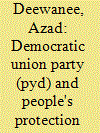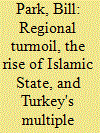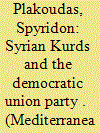|
|
|
Sort Order |
|
|
|
Items / Page
|
|
|
|
|
|
|
| Srl | Item |
| 1 |
ID:
183730


|
|
|
|
|
| Summary/Abstract |
This article explores the construction of the Syrian Kurdish Democratic Union Party (PYD) and the People's Protection Units (YPG) in Turkish official discourse. In the article, I employ critical discourse analysis (CDA) to analyze written texts produced during the years 2014–2019 that reflect the position of the Turkish authorities. The article sets out the main narratives that construct the PYD and YPG as terrorist organizations and posits them as a threat to both Turkey and the international community. The analysis reveals that these narratives serve the purpose of delegitimizing the PYD and YPG and legitimizing Turkish military operations and violations against Syrian Kurds. It highlights that the Turkish official position regarding the PYD and YPG is driven by two ideological factors: first, the influence of Kurdish autonomy in Syria on the action of Kurds in Turkey, and second, the barrier that the PYD and YPG have created against the Islamist agenda of Turkey's Justice and Development Party (AKP) in Syria.
|
|
|
|
|
|
|
|
|
|
|
|
|
|
|
|
| 2 |
ID:
149423


|
|
|
|
|
| Summary/Abstract |
Over the last several years, the political will of the governing AKP in Turkey to make the historic compromises necessary to complete the peace process with the Kurds has sharply declined. This paper will examine the causes of the breakdown in the Turkish-Kurdish peace process and the Turkish government’s lurch in a nationalist direction in its approach towards the Kurdish minority from the standpoint of ‘securitization’ theory. The key catalysts, it is argued, for the re-emergence of a securitization paradigm in Turkey’s handling of the Kurdish issue are: (1) Turkey’s stalled bid for accession to the European Union; (2) the intensifying electoral competition between AKP and the Kurdish movement parties, coupled with the instrumentalization of the Kurdish peace process to serve President Recep Tayyip Erdoğan’s quest to install a dominant presidential system and (3) the spillover effects of Syria’s civil war on Turkey’s relations with its own Kurdish populace.
|
|
|
|
|
|
|
|
|
|
|
|
|
|
|
|
| 3 |
ID:
186314


|
|
|
|
|
| Summary/Abstract |
This article examines the case of the Syrian Democratic Union Party (Partiya Yekîtiya Demokrat or PYD) to explain the survival strategies of the non-state armed actor (NSAA). Although the Middle Eastern State System remarkably remained stable after the end of Mandates, the legitimacy of states has been eroded by a combination of colonial legacy, neo-patrimonialism, and authoritarianism, laying the seeds for the rise of non-state challengers to states. At the beginning of the Syrian uprising, the PYD did not fight against the Syrian regime but established its autonomy in northern Syria by taking advantage of the chaos. Using the process-tracing method, the article explains the survival of the PYD until the territorial defeat of the so-called Islamic State and offers parameters of the territorial logic, its organizational structuring, and relations with the states to explain the survival strategies of the PYD. Finally, the study concludes that while the territorial and organizational structuring logics of the NSAA shape its strategies, its complex relationship with states determines its survival.
|
|
|
|
|
|
|
|
|
|
|
|
|
|
|
|
| 4 |
ID:
147851


|
|
|
|
|
| Summary/Abstract |
This article traces the interrelationship of the roles played by Turkey and by various Kurdish non-state actors such as the Kurdistan Regional Government, the Kurdistan Workers Party, and the Democratic Union Party, in the current turmoil in Syria and Iraq. It considers their varying perspectives on Islamic State and other jihadi groups, the tensions between the region's Kurdish non-state actors, and the differences between them in their relationships with Turkey. The background to these differences is explored, as is their impact on relationships with other actors, most notably the US. The article concludes by noting that Turkey as a regionally powerful and coherent actor, and the Kurds as a distinct ethnic group with aspirations to self-determination, will continue to be powerful elements in the region's politics.
|
|
|
|
|
|
|
|
|
|
|
|
|
|
|
|
| 5 |
ID:
154172


|
|
|
|
|
| Summary/Abstract |
By June 2016, the Kurds of Syria (just 12 percent of the country's total population) controlled almost all of the 822-kilometer Turkish-Syrian border and advanced against Manbij and Raqqa — the Islamic State's resupply center and capital, respectively. How did the Syrian Kurds grow from pariahs to kingmakers in northern Syria? This essay surveys the strategy of the Democratic Union Party (PYD), the most powerful organization among the Syrian Kurds, from 2011 until the first half of 2016, and shows how the PYD's realpolitik secured the party's survival and, eventually, success in the midst of a vicious sectarian civil war.
|
|
|
|
|
|
|
|
|
|
|
|
|
|
|
|
| 6 |
ID:
138612


|
|
|
|
|
| Summary/Abstract |
In the first weeks of October this year, an array of tanks waited on Turkey’s southern border, their commanders watching carefully as the Islamic State of Iraq and al-Sham (ISIS) fought to capture the nearby Syrian–Kurdish town of Kobane. The Democratic Union Party (PYD), the force defending the town and an offshoot of Turkish insurgent group the Kurdistan Workers’
Party (PKK), sought help from the powers allied against ISIS: the European Union, NATO, the United Nations, Turkey and, above all, the United States. But Ankara was reluctant to directly intervene in Kobane; it refused to allow help to reach the defenders and denied Washington permission to fly offensive operations out of the US Air Force base at Incirlik, in southern Turkey. Despite the threat that ISIS posed to the country further down the line, Ankara’s preference appeared to be for the town to fall, thereby dealing a heavy blow to the Syrian Kurds.
|
|
|
|
|
|
|
|
|
|
|
|
|
|
|
|
|
|
|
|
|